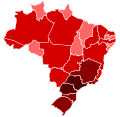2009 swine flu pandemic in Brazil
2009 Swine Flu Pandemic in Brazil
The 2009 Swine Flu Pandemic in Brazil refers to the outbreak of the H1N1 influenza virus, commonly known as swine flu, in Brazil. It was part of the global 2009 flu pandemic that affected various countries worldwide. The first confirmed case in Brazil was reported in May 2009, and the virus rapidly spread across the country, leading to a significant public health challenge.
Background[edit]
The H1N1 virus, initially referred to as "swine flu," is a novel influenza A virus that emerged in April 2009. It combined genetic material from human, swine, and avian flu viruses. The World Health Organization (WHO) declared it a pandemic in June 2009, marking the first global flu pandemic in 41 years. Brazil, like many other countries, was not spared from the impact of this virus.
Spread and Impact[edit]
The virus spread quickly in Brazil, with cases reported in all of its states. Major cities, including São Paulo, Rio de Janeiro, and Brasília, were among the hardest hit. The Brazilian government and health authorities implemented various measures to control the spread, including promoting hygiene practices, issuing travel advisories, and launching vaccination campaigns.
The pandemic had a significant impact on Brazil's public health system, economy, and society. Schools were temporarily closed, public events were canceled, and there was widespread fear and anxiety among the population. The health care system faced immense pressure due to the surge in flu cases, leading to increased demand for medical services and antiviral medications.
Response[edit]
The Brazilian government's response to the pandemic included the procurement and distribution of the H1N1 vaccine, public awareness campaigns, and strengthening the surveillance and response systems. A nationwide vaccination campaign was launched in 2010, targeting high-risk groups such as health care workers, pregnant women, and individuals with chronic health conditions.
Statistics[edit]
According to the Brazilian Ministry of Health, the pandemic resulted in thousands of confirmed cases and numerous deaths. The exact numbers fluctuated as new cases were reported and data was updated. The pandemic's peak in Brazil occurred between June and August 2009, with a second wave of cases observed in the following year.
Aftermath[edit]
The 2009 Swine Flu Pandemic in Brazil highlighted the importance of preparedness and response to infectious disease outbreaks. It led to improvements in the country's public health infrastructure, including enhanced surveillance, vaccination programs, and public health communication strategies. The experience gained from managing the H1N1 pandemic has been applied to subsequent public health challenges.
See Also[edit]
References[edit]
<references/>
2009 swine flu pandemic in Brazil[edit]
-
2009 swine flu pandemic in Brazil
-
2009 swine flu pandemic in Brazil
-
2009 swine flu pandemic in Brazil
-
2009 swine flu pandemic in Brazil
Ad. Transform your life with W8MD's Budget GLP-1 injections from $75


W8MD offers a medical weight loss program to lose weight in Philadelphia. Our physician-supervised medical weight loss provides:
- Weight loss injections in NYC (generic and brand names):
- Zepbound / Mounjaro, Wegovy / Ozempic, Saxenda
- Most insurances accepted or discounted self-pay rates. We will obtain insurance prior authorizations if needed.
- Generic GLP1 weight loss injections from $75 for the starting dose.
- Also offer prescription weight loss medications including Phentermine, Qsymia, Diethylpropion, Contrave etc.
NYC weight loss doctor appointmentsNYC weight loss doctor appointments
Start your NYC weight loss journey today at our NYC medical weight loss and Philadelphia medical weight loss clinics.
- Call 718-946-5500 to lose weight in NYC or for medical weight loss in Philadelphia 215-676-2334.
- Tags:NYC medical weight loss, Philadelphia lose weight Zepbound NYC, Budget GLP1 weight loss injections, Wegovy Philadelphia, Wegovy NYC, Philadelphia medical weight loss, Brookly weight loss and Wegovy NYC
|
WikiMD's Wellness Encyclopedia |
| Let Food Be Thy Medicine Medicine Thy Food - Hippocrates |
Medical Disclaimer: WikiMD is not a substitute for professional medical advice. The information on WikiMD is provided as an information resource only, may be incorrect, outdated or misleading, and is not to be used or relied on for any diagnostic or treatment purposes. Please consult your health care provider before making any healthcare decisions or for guidance about a specific medical condition. WikiMD expressly disclaims responsibility, and shall have no liability, for any damages, loss, injury, or liability whatsoever suffered as a result of your reliance on the information contained in this site. By visiting this site you agree to the foregoing terms and conditions, which may from time to time be changed or supplemented by WikiMD. If you do not agree to the foregoing terms and conditions, you should not enter or use this site. See full disclaimer.
Credits:Most images are courtesy of Wikimedia commons, and templates, categories Wikipedia, licensed under CC BY SA or similar.
Translate this page: - East Asian
中文,
日本,
한국어,
South Asian
हिन्दी,
தமிழ்,
తెలుగు,
Urdu,
ಕನ್ನಡ,
Southeast Asian
Indonesian,
Vietnamese,
Thai,
မြန်မာဘာသာ,
বাংলা
European
español,
Deutsch,
français,
Greek,
português do Brasil,
polski,
română,
русский,
Nederlands,
norsk,
svenska,
suomi,
Italian
Middle Eastern & African
عربى,
Turkish,
Persian,
Hebrew,
Afrikaans,
isiZulu,
Kiswahili,
Other
Bulgarian,
Hungarian,
Czech,
Swedish,
മലയാളം,
मराठी,
ਪੰਜਾਬੀ,
ગુજરાતી,
Portuguese,
Ukrainian




